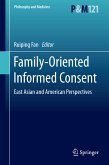IBERO-AMERICAN BIOETHICS: History and Perspectives is a landmark work, collecting the voices of those who participated in the founding and development of bioethics in Latin America, the Caribbean, and the Iberian Peninsula. The volume offers the reader a cluster of perspectives on the various births of bioethics in this region. The essays in part are irreplaceable first-person voices that give an account of how bioethics took shape within the Spanish and Portuguese cultures both in Europe and in the Americas. As such, the volume is a collection of primary sources, otherwise not available in English, that presents historical panoramas and explores the new perspectives born of the different phases of bioethics in Ibero-America - from its assimilation of bioethics to its creation of its own authentic voices. The volume also encompasses critical reflections from this region on the quite different ways in which its local bioethics have taken shape. As such, this volume also offers an introduction into the quite different concerns that frame and direct bioethics in the cultural context of Ibero-America.
The book gives a rich, deep, broad, and pluralist presentation of Ibero-American bioethics and its contribution to the international phenomenon of bioethics. It is a volume for all readers interested in bioethics, Ibero-American studies, and international approaches to health care policy.
The book gives a rich, deep, broad, and pluralist presentation of Ibero-American bioethics and its contribution to the international phenomenon of bioethics. It is a volume for all readers interested in bioethics, Ibero-American studies, and international approaches to health care policy.
Dieser Download kann aus rechtlichen Gründen nur mit Rechnungsadresse in A, B, BG, CY, CZ, D, DK, EW, E, FIN, F, GR, HR, H, IRL, I, LT, L, LR, M, NL, PL, P, R, S, SLO, SK ausgeliefert werden.
From the reviews:
Pessini, Barchifontaine, and Lolas have succeeded in gathering and superbly focusing a rich exploration of the origin and development of bioethics in Ibero-America. To understand American bioethics in perspective, from now on one will need to read this volume. It is a major cultural resource.-David Solomon, Center for Ethics and Culture, University of Notre Dame
No one interested in Latin-American studies, and surely no one with interest in the global phenomenon of bioethics, can do without this book. This is a splendid and rich portrayal of the birth and maturation of Ibero-American bioethics.-Nicholas Capaldi, Loyola University New Orleans
"This volume ... addresses the topics of the development of bioethics on the territory of Latin America (including the role of Portugal and Spain in it, as these European cultures played a major part in the creation of the Latin American cultures), main features of bioethics, and guidelines for future achievements. ... It also provides the reader with the possibility to get acquainted with the kind of bioethical perspective that differs quite a lot from the dominant Anglophone, North American and European, bioethics." (Robert Doricic, JAHR, Vol. 2 (4), September, 2011)
Pessini, Barchifontaine, and Lolas have succeeded in gathering and superbly focusing a rich exploration of the origin and development of bioethics in Ibero-America. To understand American bioethics in perspective, from now on one will need to read this volume. It is a major cultural resource.-David Solomon, Center for Ethics and Culture, University of Notre Dame
No one interested in Latin-American studies, and surely no one with interest in the global phenomenon of bioethics, can do without this book. This is a splendid and rich portrayal of the birth and maturation of Ibero-American bioethics.-Nicholas Capaldi, Loyola University New Orleans
"This volume ... addresses the topics of the development of bioethics on the territory of Latin America (including the role of Portugal and Spain in it, as these European cultures played a major part in the creation of the Latin American cultures), main features of bioethics, and guidelines for future achievements. ... It also provides the reader with the possibility to get acquainted with the kind of bioethical perspective that differs quite a lot from the dominant Anglophone, North American and European, bioethics." (Robert Doricic, JAHR, Vol. 2 (4), September, 2011)









